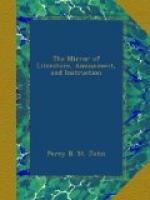“There waves a standard o’er
the brae,
There gleams a highland sword;
Is not yon form the Stewart, say,—
Yon, Scotland’s Martial
Lord?
Douglas, with Arran’s stranger chief,
And Moray’s earl, are
there;
Whilst drops of blood, for tears of grief,
The coming strife declare.
Oh! red th’ autumnal heath-bells
blow
Within thy vale, Strathearne;
But redder far, ere long, shall glow
The flowers of Bannockburn!
“Alas! for Edward’s warrior
pride,
For England’s warrior
fame;
Alas! that e’er from Thames’
fair side
Her gallant lances came!
Lo! where De Bohun smiles in scorn,—
The Bruce, the Bruce is near!
Rash earl, no more thy hunter horn
Shall Malvern’s blue
hills hear!
Back, Argentine, and thou, De Clare,
To Severn’s banks return
Health smiles in rural beauty there,—
Death lours o’er Bannockburn!
“Up, up, De Valence, dream no more
Of Mothven’s victor
fight—
Thy bark is on a stormier shore,
No star is thine to-night.
And thou, De Burgh, from Erin’s
isle,
Whom Eth O’Connor leads,
Love’s tear shall soon usurp his
smile
In Ulster’s emerald
meads.
But oh! what tears will Cambria shed
When she the tale shall
learn—
For Forth’s full tide shall flow
blood red,
Ere long, from Bannockburn!
“But not alone shall Southron vale
Lament that day of woe—
Grief’s sigh shall soothe each ruder
gale
Where Scotia’s waters
flow.
From Corra Linn, where roars the Clyde,
To Dornoch’s ocean bay—
From Tweed, that rolls a neutral tide,
To lonely Colinsay:—
But see, the stars wax faint and few,
Death’s frown is dark
and stern—
But darker soon shall rise to view
Yon field of Bannockburn!”
* * * * *
RIVER MELODIES.
Between Pittsburgh and Shawneetown, whilst “gliding merrily down the Ohio” in a keel-boat, “navigated by eight or ten of those half-horse and half-alligator gentry commonly called Ohio boatmen,” Judge Hall was lulled to sweet sleep, as the rowers were “tugging at the oar,” timing their strokes to the cadence:—
“Some rows up, but we rows
down,
All the way to Shawnee town:
Pull away—pull away.”
* * * * *
REAL DISCONTENT.
The following anecdote is related of Robert de Insula, or Halieland, a man of low birth, and one of the bishops of Durham:—Having given his mother an establishment suitable to his own rank, and asking her once, when he went to see her, how she fared, she answered, “Never worse!”—“What troubles thee?” said the bishop; “hast thou not men and women enough to attend thee?”—“Yea,” quoth the old woman, “and more than enough! I say to one—go, and he runs; to another—come




